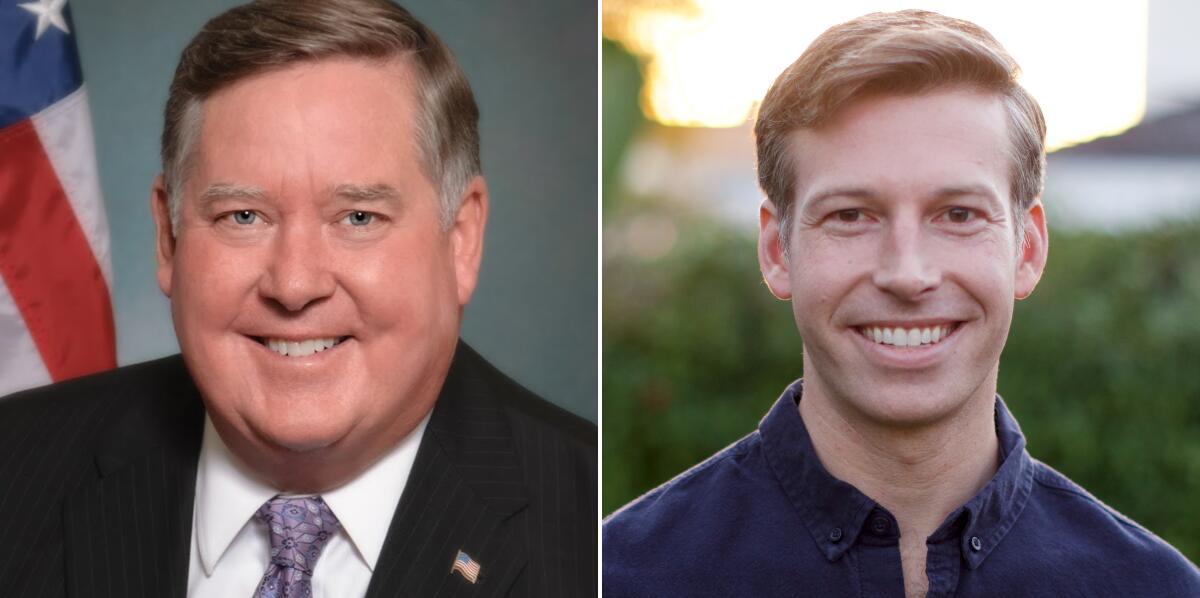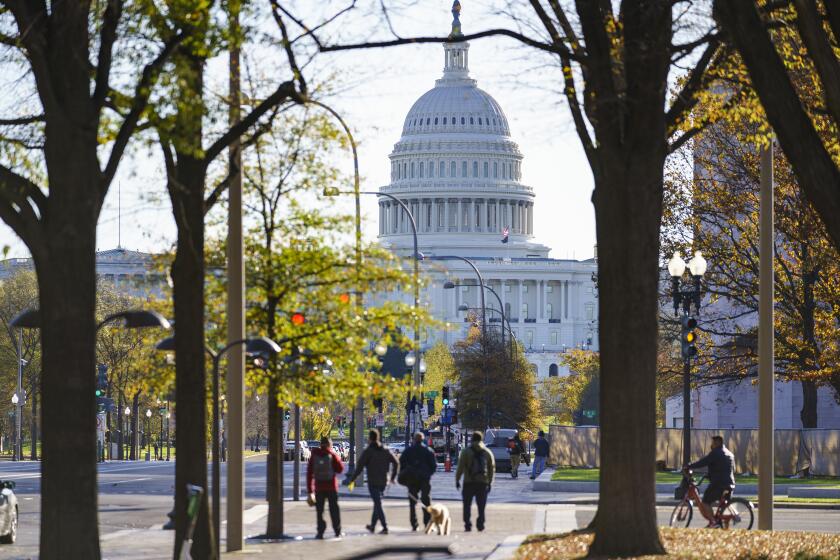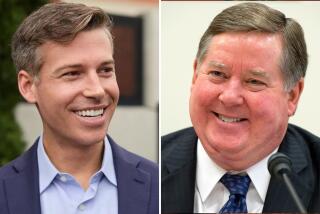LGBTQ+ culture wars surface in heated Riverside County congressional race

- Share via
What could have been a routine vote in Congress to approve transportation funding has become a culture war flashpoint in one of the nation’s most competitive House races — the fight for a Riverside County seat, with GOP Rep. Ken Calvert facing a challenge from a Democrat in a race that is drawing national attention.
Calvert, who has represented parts of the Inland Empire for more than 30 years, was among the House Republicans who voted last week to yank funding from three LGBTQ+ community centers in Massachusetts and Pennsylvania, handing Democrat Will Rollins an easy attack line in the race to represent a district with one of the largest concentrations of LGBTQ+ voters in the nation.
Calvert responded with an attack of his own: Pointing out that one of Rollins’ donors had mingled with Jeffrey Epstein, the wealthy financier accused of sex trafficking involving dozens of underage girls before he died in a New York City jail cell in 2019 in what was ruled a suicide.
Ugly personal attacks date back decades in Calvert’s congressional races. In 1994, his Democratic rival highlighted that Calvert had admitted having sex with a prostitute, and Calvert allies outed his foe as a gay man.
But a lot has changed since then. In the recently redrawn 41st Congressional District, Calvert now represents an area that stretches from his hometown in the suburb of Corona on the west to the golf courses of Palm Springs and Rancho Mirage on its eastern edge — which has shifted the politics of his district from red to purple.
“It’s a ticking time bomb for Republicans,” said David Wasserman, a congressional forecaster for the nonpartisan Cook Political Report, which recently reclassified the district from GOP-leaning to a toss-up.
That makes Republicans’ focus on culture wars over LGBTQ+ issues salient in this election — especially because Rollins, the Democratic challenger, is a gay man who lives with his partner in Palm Springs, the first city in the nation to elect an all-LGBTQ city council.
Rollins is trying to oust Calvert for a second time after narrowly losing to him last year, and the contest is one of several in California that could determine which party controls the House.
Several congressional contests in Southern California could determine whether Democrats win back control of the U.S. House of Representatives.
Calvert, who did not respond to multiple interview requests for this article, has a history of voting against LGBTQ+ rights, but said during the 2022 campaign that his views had since evolved. He said he had changed his mind about same-sex marriage and now believes the 2015 Supreme Court ruling that legalized such partnerships should not be overturned.
But Rollins sees Calvert’s recent vote on the powerful House Appropriations Committee to strike $3.6 million in federal earmarks to three LGBTQ+ projects, including a senior housing development, as evidence that his claim to support gay rights is a sham.
“I don’t really understand how voting to gut meals for vulnerable LGBT seniors does anything to improve traffic in Corona, to lower the cost of rent in Menifee, to fix our climate,” Rollins said in an interview. “It’s just a bizarre set of priorities that he has for his district.”
In a statement, Calvert said that the three facilities were engaged in political activism that included “pro-communism propaganda, gender affirming care with no age specification, and sexually explicit material for children.”
“I believe most of my constituents, regardless of sexual orientation, do not believe that U.S. taxpayer dollars should be used on activities that undermine the foundations of our country,” he said. “I do not condone discrimination of any kind and I will always vote my conscience.”
It was the second time in July that House Republicans had turned a routine act of governance into a front in the culture wars. Earlier this month, Calvert voted with most Republicans to pass a national defense bill that included provisions to restrict abortion access, transgender medical treatment and diversity training for members of the military.
Also this month, Calvert’s campaign blasted Rollins for receiving support from LinkedIn founder Reid Hoffman, who participated in at least two events with Epstein, the politically connected hedge fund manager who pleaded guilty in 2008 to procuring a child prostitute and registered as a sex offender. After Epstein served his sentence, he continued to associate with politicians, businessmen and other power brokers until his death in 2019.
In 2014, Hoffman visited Epstein’s private island in the U.S. Virgin Islands — where the financier was accused of trafficking teenage girls — for a fundraising trip for the Massachusetts Institute of Technology, and invited him to a dinner the following year with tech leaders in Palo Alto, according to a 2023 article by the Wall Street Journal. He told the newspaper that his interaction with Epstein “gnawed” at him, and said, “I am sorry for my personal misjudgment.”
In 2019, Hoffman told Axios that he last interacted with Epstein in 2015.
“By agreeing to participate in any fundraising activity where Epstein was present, I helped to repair his reputation and perpetuate injustice,” Hoffman said to Axios. “For this, I am deeply regretful.”
Calvert’s campaign highlighted a Fox News article that noted that Hoffman had contributed $6,600 to Rollins’ 2024 campaign and had donated $2,900 to Rollins during the 2022 election. In the same election cycle, Hoffman wrote a check for nearly $1.2 million to the Welcome PAC, an independent committee not affiliated with Rollins’ campaign that spent nearly $600,000 backing the Democrat’s bid.
“Every voter should be troubled by the fact Will Rollins’ biggest campaign supporter was just exposed as an associate of convicted pedophile Jeffrey Epstein,” said Jason Gagnon, a spokesman for Calvert’s campaign. “We need someone in Congress who will fight to keep us safe, not another soft-on-crime liberal who is financed by billionaire buddies of pedophiles.”
Rollins said Calvert’s attempt to link him to Epstein was “ridiculous.”
“It’s a perfect example of him trying to distract from real issues that affect people in Riverside County, whether it’s the commute in Corona that a lot of people have to deal with day after day, whether it’s rising rents, whether it’s lower wages for working families, whether it’s his fixation on attacking the LGBTQ community or trying to tie me to conspiracy theorists,” Rollins said.
“This is a distraction from his failure to deliver for his own voters,” he added.
Though the election is more than a year away, donors are already shelling out. Calvert raised $1.9 million, the 17th-most of any House candidate in the nation, in the first six months of the year, according to Federal Election Commission financial disclosure reports released in July. Rollins raised $905,000, and in the most recent quarter reported the second-largest haul in the nation among candidates challenging House incumbents.
“Many Democrats said, ‘This is a district [former President] Trump carried, so we don’t have a great chance.’ But it’s moving toward Democrats with such velocity that it might be an even better target than some of the districts” that President Biden won, Wasserman said.
The once solidly Republican region has grown less conservative in recent years, a transformation hastened by Los Angeles transplants seeking affordable housing. In 2021, the once-a-decade redrawing of congressional district boundaries excised solidly GOP areas and added liberal Palm Springs.
Until last year, Calvert — the longest-serving GOP member of California’s congressional delegation — had not faced tough races for much of his tenure. He beat Rollins by 4.6% — 11,100 votes — in 2022, according to the California secretary of state’s office.
Rep. Ken Calvert, who has opposed gay rights and once attacked an opponent for being gay, is facing a challenge from a gay Democrat in a newly competitive district.
Calvert’s early races were tight — and contentious. After narrowly winning office in 1992, his reelection campaign two years later prompted headlines across the nation. His allies outed Democratic rival Mark Takano and his campaign mailed voters hot-pink and lavender fliers asking whether Takano would side with the interests of their fellow Riverside County residents or with those of San Franciscans.
Takano sent out mailers that referenced police catching Calvert with a prostitute the previous year, and ran radio ads featuring Jay Leno joking about the matter. (Takano now represents an adjacent district in Congress and has an amicable relationship with Calvert, occasionally working with him on legislation that benefits the region.)
After the 1994 election, the headline on a column in The Times summed it up like this: “In This Sleaziest of Races, Victor Won by a Mudslide.”
More to Read
Get the L.A. Times Politics newsletter
Deeply reported insights into legislation, politics and policy from Sacramento, Washington and beyond. In your inbox twice per week.
You may occasionally receive promotional content from the Los Angeles Times.












